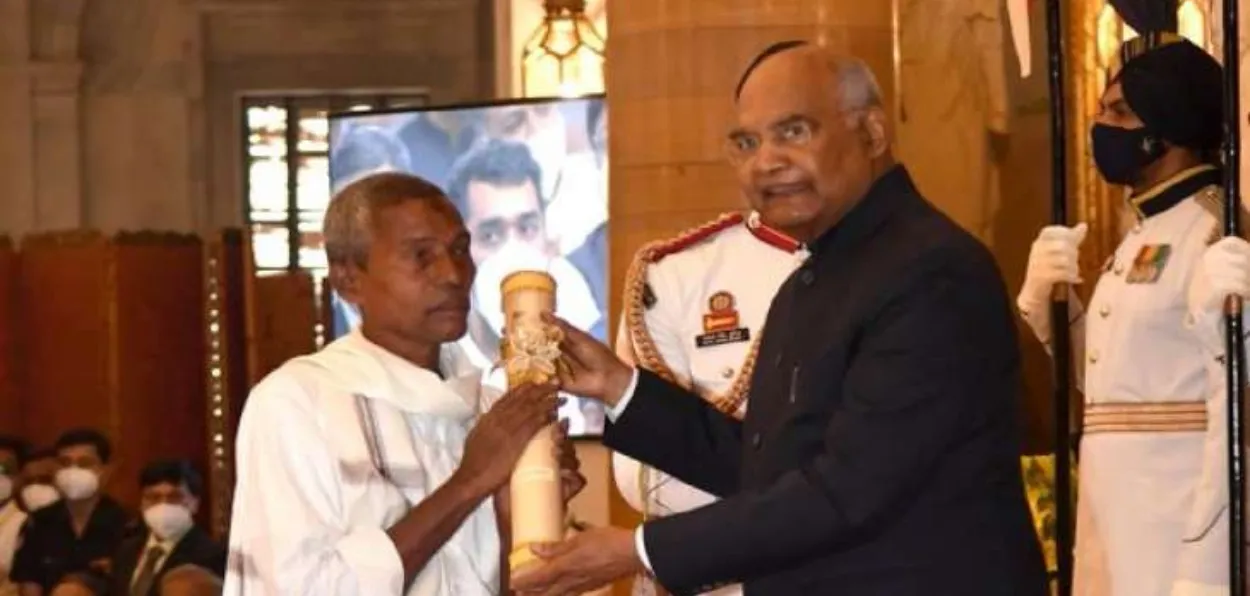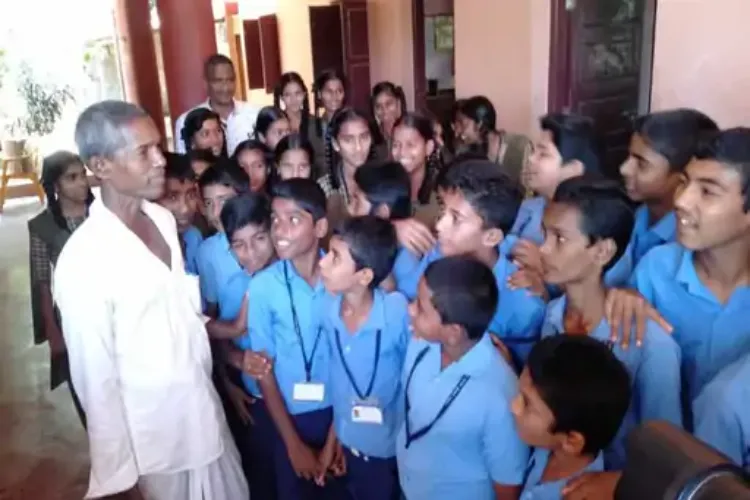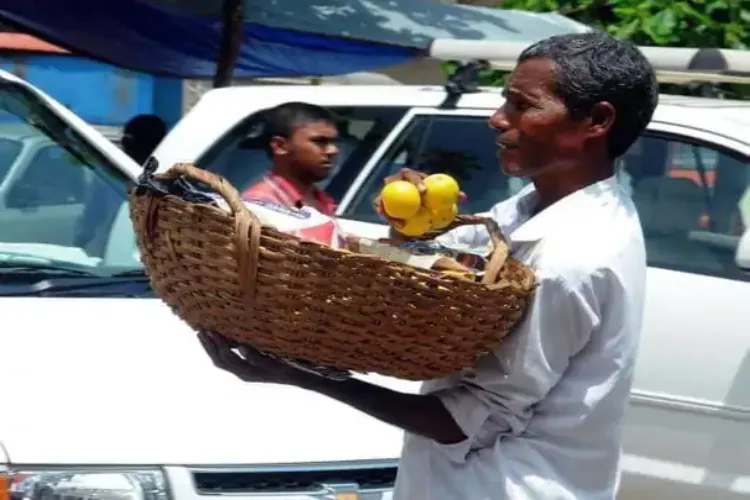
Onika Maheshwari / New Delhi
On 8 November 2021, the ornate Rashtrapati Bhavan in Delhi was packed with important guests who had come to witness the conferring of Padma awards on citizens who had contributed to making India a better place to live in.
As soon as the name of Harekala Hajabba was announced and a barefooted tall man dressed in a white dhoti-kurta was escorted toward the President, the hall resonated with applause. Prime Minister, his cabinet colleagues, and others were in awe of the man who was walking to receive the highest civilian award in India.
Harekala Hajabba is a fruit seller from Mangaluru city of Karnataka, who has been running a school for the poor children in his native village Newpadapu for 10 years. Last year Hajabba, who is popularly known as Akshara Santa (The Saint of letters) by locals received Padma Shri from the then President Ram Nath Kovid for doing “excellent work in human service and education.”
Harekala Hajabba is a living example of richness not being defined by the possession of wealth; but by a large heart and empathy with others.
Hajabba founded his school with savings from selling oranges in the city and cutting down his expenses including travel and food. His mission was triggered by an awkward experience he had while selling oranges as he was unable to communicate with a foreign couple who spoke in the English language.
He decided not to let the same happen to others who would remain unschooled due to a lack of resources.
Harekala Hajabba never went to a school; as he couldn’t read or write people made fun of him.
“I didn't even know the meaning of the Padma Shri award. Just knew that there is some big award. I was repeatedly looking at the President with folded hands and the President was telling me to look at the camera,” he told the media after receiving the award.
The 66-year-old Harekala Hajabba’s story was shared by IFS officer Parveen Kaswan on his Twitter account. He wrote: When Hajabba got the news of being honored with the Padma Award, he was standing in line at a ration shop. He was surprised to hear this news.
Harekala Hajabba was in a line on a ration shop when authorities informed him that he got #Padma Shri. This fruit seller from Dakshin Kannada is educating poor children in his village of Newpadapu from a decade in a mosque. Doing all the efforts including spending his savings. pic.twitter.com/rufL3RZ15o
— Parveen Kaswan, IFS (@ParveenKaswan) January 26, 2020
“My news was published in every newspaper, my photo was published. Big people started coming to meet me. I was invited to speak at big platforms, organizations started honouring them,” he told the local media persons after receiving the award
Harekala Hajabba’s village is only 20 km from Mangaluru city and yet there was no school when Harekala was a child and till he opened the school.
His parents worked as daily wagers and could barely make ends meet.
Under these circumstances, Harekala couldn't attend school. As a child, he started doing odd jobs to add to the meager income of his family and ended up selling oranges in Managulur.
For a few years, Hajabba also worked as a beedi maker. The earnings from beedi making were not enough to sustain his family. He looked for other jobs but failed to get one because he couldn’t speak any other language but Tulu.
In the year 1978, he knew that many English tourists visit the city of Mangaluru and most of them buy oranges. One day he went to the main bus station of Mangaluru. For days he observed others sell oranges. Finally, he calculated the matrix of the business of selling oranges. It was a profit-making venture.
Harekala Hajabba says it was on a day in 1994 when an English couple came to him at the bus stand. “They started speaking to me and asking questions. I did not understand their language. For a long time, they kept trying to make me understand them.”

Harekala hajjab with school children
Thereafter the couple was angry. They freaked out and went to another seller while muttering something. “It hurt me a lot. I was not educated, so the British couple left after insulting me,” he said.
When Harekala returned home, he was very upset. For many days, he felt suffocated. “I kept thinking about what can be done so that nobody makes fun of an uneducated person.”
There was no school in his village and therefore many children would end up like him - illiterate. “Though I could not study, I decided that no child of my village should remain illiterate. However, I had no idea how to go about it. Also, I knew that nobody will tell me what to do; I had to do it all by myself.”
The next day went to the bus stand as usual. First sold oranges and then after saving some money went to a typist at the local shop. “I told him my point of view. He wrote an application on my behalf to the local MLA for opening a school in the village”.
"The MLA was surprised to see the letter in my hand. I was happy and thought the MLA would open the school in the village.”
“After a few days, I again went to the MLA. Again he told me that he was considering my application. I would visit him often to enquire about the status of my application. Nothing was moving.
One day, someone told him that he should go to the Block Education Officer. “I inquired about his office and after selling oranges reached there. I gave him the letter demanding the opening of a school in my village. He read my letter and said that he will see what can be done.”
“After a few days, I understood that these people are just making me go round from one office to another. It cost a lot of money and time. I stopped going to my village to save time.”
After selling oranges, he slept at the bus stand, went hungry, or ate only one meal to save money.

Harekala Hajjab selling oranges at bus stand
I used to stand outside the government office with applications in every season, rain or shine. Sometimes the officers used to meet me and sometimes chase me away. Gradually, staff in the education department started recognizing me.”
On his experience, Harekala says, “Sometimes people praised me, and some thought I was crazy. Some made fun of me. However, it made no difference to me. All I wanted was that somehow a school should start in the village.”
Finally, In June 2000, on my application, the land was allotted for the school, and a teacher was also posted by the government. All this was on paper and nothing changed in his village.
Harekala realized his battle has just begun.
“I realised the system functions like this; if I remain dependent on it, the school will never start.”
He knew there was a madrasa nearby. One day he went to the Madrasa management and asked them to provide a room for the school till the time school is built.
They agreed and Harekala met the deputy commissioner. “I told him that the people of the madrassa are ready to provide a place for the school and he should post a teacher for it.
Until our school is built, the children of the village will study in the madrassa only.
DC agreed to run the school in the madrasa. Classes started with 28 children.
In 2001, a plot of land measuring 1.33 acres was allotted for the school. Now I got busy day and night in getting the building constructed.
He went door to door to raise funds from the locals for the school. He would pump in all his earnings from selling oranges into the construction of the school building. His dream was taking shape, slowly.
His family lived in a mud house with a thatched roof that was in danger of collapsing in case it rained heavily. He had a set of dhoti-kurta that he washed every night to dress up neatly the next morning.
He continued to save money for the school. In a few years, after everyone's efforts, the school was completed.
He was so happy to see all the children of the village going to school enthusiastically. “It was not a personal achievement; a lot of people chipped in with money. When the school was being built, every day I used to wonder how it would be completed.”
Meanwhile, a Tulu language journalist did a story on Harekala. “Gradually, stories about my work started appearing in Kannada newspapers as well. People started getting to know me. The local MLA also supported and appreciated my work.”
In 2020 when it was announced that I will get the Padma Shri award I did not even know what it was and why it was given. After speaking to others I realized it was a big award.”
He said,” After reading my story, a person got my house fixed, but I don't know his name. He prefers to remain anonymous.
“Now I want to open a pre-degree college for the children in the village. Day and night I am engaged in the same effort so that the villagers do not have to go far for further studies.
“I see the children of the village going to school. I see them reading. I see you doing better. This is the biggest happiness for me. Seeing them, I forget years of fatigue and struggle. Even today I go to Mangaluru on foot."
